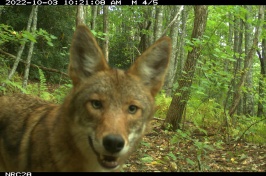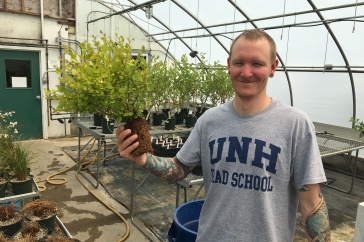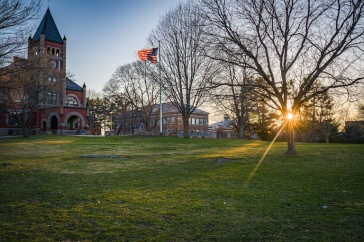The Fairchild Dairy Teaching and Research Center, a facility of the N.H. Agricultural Experiment Station (NHAES) at the University of New Hampshire College of Life Sciences and Agriculture (COLSA), will mark its 25th anniversary Wednesday, Oct. 29, with a celebration that will include presentations of the university's current dairy research.
The three-hour event starts at 9 a.m. at the Fairchild Dairy Center at 36 O'Kane Road off Mast Road Extension in Durham. The celebration is free and open to the public.
"With more than $50 million in annual milk sales, the New Hampshire dairy industry is a critical component of the state's agricultural economy. The Fairchild Dairy Center and NHAES scientists serve Granite State dairy producers by working with them to improve dairy operations and find solutions to important dairy-related issues that impact their livelihoods," says Jon Wraith, director of the N.H. Agricultural Experiment Station and dean of the UNH College of Life Sciences and Agriculture.
The Fairchild Dairy Center develops new knowledge and management expertise focused on improving animal health and the profitability of the regional dairy industry, which is of interest to many state and regional stakeholders. The anniversary event will highlight research on a wide variety of topics, including those related to alternative feeds for dairy cows, nitrogen retention and nutrient partitioning calves, bioavailability of certain amino acids and dairy cow fertility.
The facility houses 87 milking-age Holstein and Jersey cows and approximately 70 growing, replacement animals. Included in that number is the 20-cow, student-managed Cooperative for Real Education in Agricultural Management (CREAM) herd, with the remaining animals devoted primarily to research in the area of dairy nutrition and reproductive biology. Cows at the Fairchild Dairy Center produce an average of about 26,000 to 27,000 pounds of milk per cow per year, which is greater than the national average of about 22,000 pounds per cow a year.
Long recognized for its quality milk and operations, the center's research herd was recognized by Dairy One with a Quality Milk Award for consistently producing milk with a low somatic cell count throughout the year in 2013. The center has received two Gold Quality Award from the Dairy Farmers of America. In 1999, the farm was cited as a Dairy of Distinction by the Milk Sanitation Board, which in 2000 awarded it a certificate of quality. In 1997 and 2004, the CREAM herd was recognized by Dairy One for having the highest quality milk (lowest somatic cell count) from among approximately 3,100 dairy herds on the official Northeast Dairy Herd Improvement Association (DHIA) test.
Dairy herds with a low somatic cell count tend to be more profitable herds since they have reduced treatment and veterinary costs for mastitis, which is the most common and costliest disease for dairy cattle, higher milk production per cow, and higher milk quality premiums. In addition, milk with lower somatic cell counts has a longer shelf life and results in a higher yield of cultured dairy products.
In addition to its research mission, the Fairchild Dairy Center has a strong role in academics and outreach. Some 20 UNH courses use the dairy in classes spanning nutrition, breeding, agriculture and law. The dairy receives thousands of visitors each year and hosts many public programs including: NH Ag in the Classroom School to Farm Days for fourth-graders, Little Royal Dairy and Equine Show, Future Farmers of America Interscholastic Competition and many visits from school groups. Each summer the Fairchild Dairy participates in the Granite State Dairy Open Barn Promotion, and visitors are treated to ice cream made from NH milk.
-
Written By:
Michelle Morrissey ’97 | UNH Magazine | michelle.morrissey@unh.edu




















































